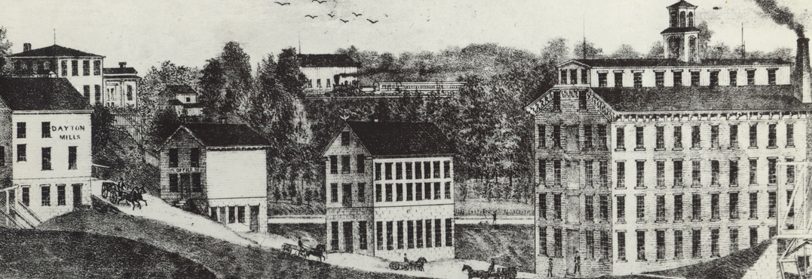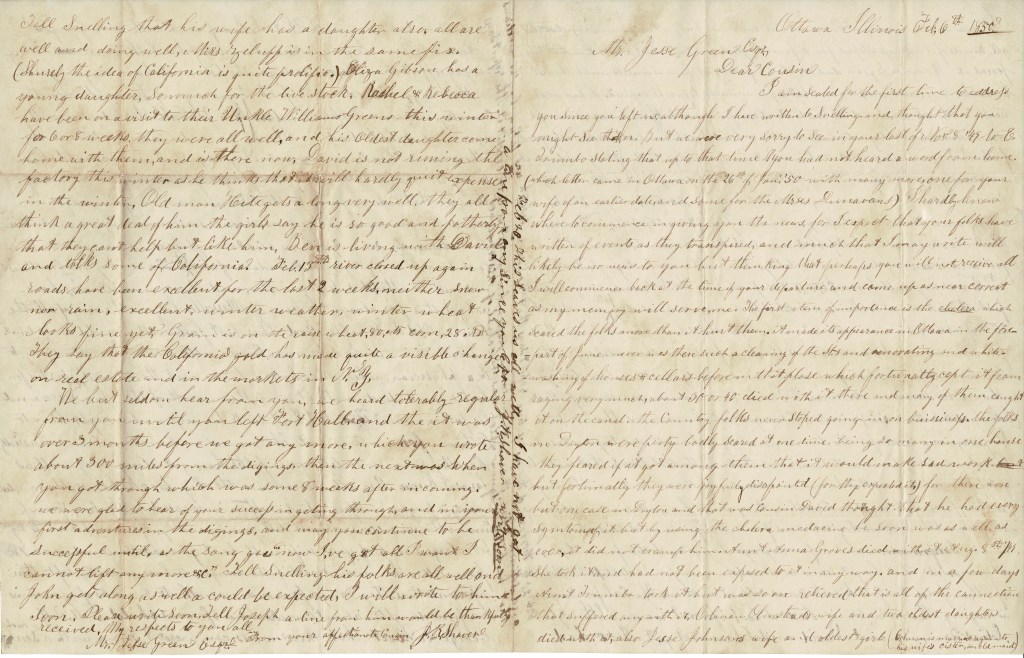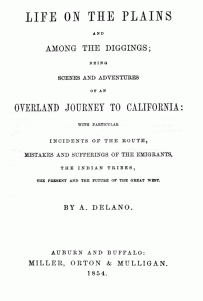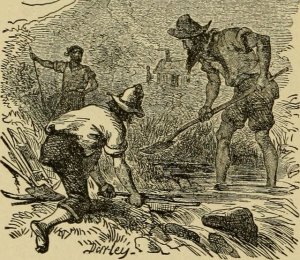Forty-five years after the incidents related here, Jesse Green wrote this article about his experience with hypnotism:
“An Amateur Mesmerist”
“How I became interested in the investigation of Mesmerisn”
In the fall of 1848 one Doctor Underhill visited Dayton where I then resided, with a Mesmeric subject and claimed that through him he could among other things find lost property. He undertook to find a pair of buggy wheels lost in fording the River during a high stage of water a short time previous. The buggy wheels were lost by Dr. Ward of Marseilles.
He started in at the ford, and when in the River opposite my house, the subject said “he saw no buggy wheels, but there lay an old saddle under a ledge of rocks in deep water”. There had not been a word said about a saddle being lost.
But I had lost my saddle during the same rise in the River, and he described it as well as if lying before him, which was an easy matter as I had started hastily to cross the River, and found one of my stirrups gone, and took an odd one in its place. We then went under his directions, in a boat with a lantern, and persons on the bluff overlooking the River, and in communication with the subject (Jockey Smith) who directed us to the spot. We did not find the saddle but found the ledge of rocks in about ten feet of water.
This so impressed me that I together with a number of others got the Doctor to deliver us a course of lectures on Mesmerism, and the night of the third lecture he had us all take a subject and see what success we might have. I selected my sister and succeeded in getting her Mesmerised, before the Doctor got his, and gave her up to him, not yet knowing how to proceed farther, but soon became familiar with all the Doctor knew on the subject. During that winter I Mesmerised eight or ten different persons. My first experience worthy of note was with my first subject. Father requested me to send her to Newark, Ohio, and from there up the Ohio Canal, and see if she could name the Towns she would pass through (he being familiar with the whole length of the canal, having built fifteen miles of it). She would name places in their regular order (apparently by reading some sign giving the name) and when she reached Cleveland she exclaimed “Oh! what a great body of water”. Father was fully satisfied that she either read the signs correctly or read his mind. This much I know they can do. My best subject being the best clairvoyant I had outstripped this all hollow. He would personate anyone, in speech, actions, and in every way. I had him sing by exciting the organ of tune, and have thrown it off, at the highest pitch in the tune, with the word half uttered, and in a half minute or so would excite the organ again when he would start in again where he left off with the same pitch of tune, and the other half of the word as perfect as if there had been no intermission.
During one evening some one suggested that I “have him look ten years into the future and see what he would say about Dayton”. Of course I had no faith that he could tell anything reliable, but did so. He looked around a little and said it had not improved much “but they have a new mill down there and Uncle Johnny is up in the third story”. Uncle Johnny was my Father and lived a number of years after that mill was built, and I believe that this clairvoyant saw it seven years previous to its being built. It may be said that he guessed it.
I will relate another experience that will show too much complication to admit of guess work. This all occurred during the winter of 1848 and ’49, and we were calculating to go to California in the Spring (and in the clairvoyant state) I sent him there to see what he would say about it. We did not get much information only that there seemed to be a great rush to that country, and they were getting plenty of gold”. It seemed to him in returning that he met our train going in the spring and his first exclamation on meeting it was “See that wagon, how they have fixed it up”. I inquired about the wagon and he said it was “George Dunavans wagon and that they had broken the coupling pole, and had it wound with ropes and chains, and Uncle Johnny is behind carrying some birds”. When he told this Father had no idea of going to California with us. The Company employed him to go to Missouri and buy oxen for the outfit and return home, but there being so much cholera on the River he preferred crossing the Plains, rather than risk getting the cholera on his return. Our company consisting of forty nine men with twenty wagons, left Ottawa April 2, 1849. Myself being elected captain of the Company, one day on the route a short distance East of Fort Kearney, my clairvoyant (Daniel Stadden) borrowed a horse from one of the company and rode ahead with me, when we were a mile ahead of the train we saw that they had stopped, and by the time we rode back to see what was the matter, here was George Dunavans wagon reach broken and wound with both ropes and chains and Father was behind carrying a sage hen he had shot. Stadden said to me “that is just how I saw it when I was mesmerised”.
Had it been any other wagon we probably should not have thought anything further about his prophecy, but every circumstance connected with it, being literally fulfilled brought it vividly to the minds of both of us.
I have often regretted that on my return home I had not further investigated it, I did very little in California but on our return home via Mexico one of our Company had a horse stolen and having faith in Mesmerism he wanted me to Mesmerize Mr. A.B.Goodrich (one of my former subjects) and one of our Company to see if he could find his horse. I was a little afraid to do so there knowing the superstition of that people, but we had an interpretor who went and saw the Alcalde of the place and found that he had seen it before, and was anxious that I should Mesmerize Goodrich, he being present with our interpretor. He soon described the thief and pointed out the direction he had taken, describing minutely every crook and turn in the road, and where the thief had stopped for the night. The Alcalde had such confidence in everything that he said he would send next morning to recover the horse and thief if possible. We were driving five hundred horses, and did not wait to see the result.
I think the possibilities of Mesmerism are very imperfectly understood even at the present time. I have frequently seen accounts published of what seemed a little strange, but nothing equal to my experience with it.
I should have taken up the further investigation of it, but my second wife thought she could see the cloven foot of his Satanic Majesty in it, and on her account I gave it up, but my experience was entirely the reverse, and with evil intentions I was taught and believed it would prove a deserved failure.
It may be asked by some, why did you not have your clairvoyant find gold for you in California. I do not pretend to say whether he could have done so or not. The poor fellow died of scurvy soon after reaching California.
Should this seem a little too fishy, I would say that there are still living witnesses to corroborate the facts stated.
Ottawa
October 17th 1894,
Jesse Green.






